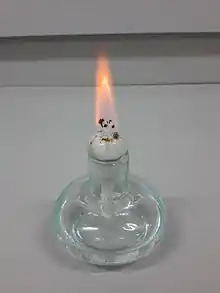Alcohol burner
An alcohol burner or spirit lamp is a piece of laboratory equipment used to produce an open flame. It can be made from brass, glass, stainless steel or aluminium.[1]
Uses
Alcohol burners are preferred for some uses over Bunsen burners for safety purposes, and in laboratories where natural gas is not available. Their flame is limited to approximately 5 centimeters (two inches) in height, with a comparatively lower temperature than the gas flame of the Bunsen burner.[2][3]
While they do not produce flames as hot as other types of burners, they are sufficiently hot for performing some chemistries, standard microbiology laboratory procedures, and can be used for flame sterilization of other laboratory equipment.[4][5]


A small alcohol burner is also preferred for camping when the need for fire is modest. It burns the alcohol vapor that raises due to the heat from the flame through the holes on the top perimeter of the container.
Operation


Typical fuel is denatured alcohol, methanol, or isopropanol.[2][3] A cap is used as a snuffer for extinguishing the flame.
References
- Griffin, John Joseph (1838). Chemical Recreations: A Compendium of Experimental Chemistry, Part 1 (8th ed.). Glasgow: Richard Griffin and Co. pp. 17–21.
- "Laboratory Burner Safety" (PDF). safety.ucanr.edu. University of California. 2007. Retrieved 2015-06-17.
- Braham, R (2002). "Standard Operating Procedure - Safe Use of Alcohol Burner" (PDF). ovc.uoguelph.ca. Department of Biomedical Sciences of Ontario Veterinary College. Retrieved 2015-06-17.
- "Low-tech Microbiology Tools". teach.genetics.utah.edu. Archived from the original on 2015-06-27. Retrieved 2015-06-26.
- Myers, D. N.; Sylvester, M. A. (1997). "7.1.1. Equipment and Equipment Sterilization Procedures" (PDF). National field manual for the collection of water-quality data. Techniques of Water-Resources Investigations, book 9. USGS.

